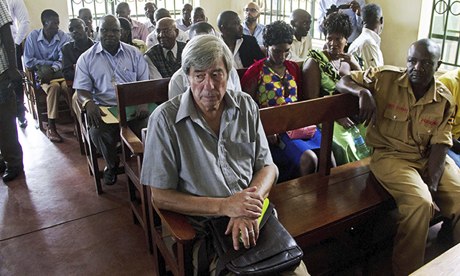 Bernard Randall, the British gay man charged with homosexuality-related offences in a Ugandan court, glances up sceptically when I walk into his lawyer's chambers. His Ugandan partner, Albert Cheptoyek, sits protectively in front of him, closer to the door, on a rickety wooden bench. Cheptoyek's white shirt illuminates his dark sweaty skin, while Randall's oversize dull-coloured clothes match his face, making him almost invisible.
Bernard Randall, the British gay man charged with homosexuality-related offences in a Ugandan court, glances up sceptically when I walk into his lawyer's chambers. His Ugandan partner, Albert Cheptoyek, sits protectively in front of him, closer to the door, on a rickety wooden bench. Cheptoyek's white shirt illuminates his dark sweaty skin, while Randall's oversize dull-coloured clothes match his face, making him almost invisible.
And that perhaps may just be the effect he needs to get through the ordeal of having the content of a sex tape of him and his 30-year-old partner splashed over newspapers and across the media here. And not just any media, but the media of a country that has declared homosexuality to be an evil practice, a cancer imported from the west that must be stamped out no matter what the cost.
In 2009, Ugandan MPs proposed the death penalty for certain homosexual acts. The anti-homosexuality bill was shelved after international pressure, but it remains on parliament's order paper and could be debated and passed at any time.
In Uganda the media routinely out gay people in an attempt to "protect" the moral fabric of society. In 2010 a tabloid called the Rolling Stone printed the names and addresses of people perceived to be gay and called on the public to hang them.





 Why are the monks walking?The monks embarked on the journey to remind Americans that peace is...
Why are the monks walking?The monks embarked on the journey to remind Americans that peace is... Alberto Castañeda Mondragón says his memory was so jumbled after a beating by immigration officers that...
Alberto Castañeda Mondragón says his memory was so jumbled after a beating by immigration officers that...






























